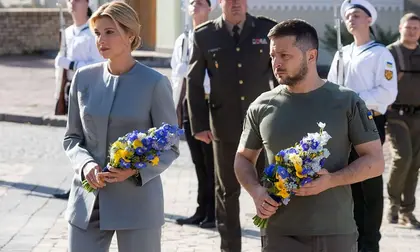This year Ukraine’s Independence Day on 24 August also marked six months since the beginning of Putin’s war against Ukraine. In an address to the United Nations, Ukrainian President Voldymyr Zelensky stressed the importance of Ukrainian independence for the world: if Russia is not stopped, “Russian murderers will probably end up in other countries”, he warned. Commentators discuss the prospects for Europe.
Today, Europe’s press debates the ongoing Russian invasion of Ukraine. Here are some opinions from a selection of European publications, presented by eurotopics.
JOIN US ON TELEGRAM
Follow our coverage of the war on the @Kyivpost_official.
Time to turn things around
Ukraine must be helped so it can win a definitive victory, writes Deutsche Welle’s Romanian Service:
“Looking at the situation rationally, we must conclude that the West, which has adjusted its positions too slowly, hesitantly and gradually over the past six months, must now make a final about-turn, resolutely rearm Ukraine, and thus help it to drive out the invaders. … Such a victory would greatly discourage the global neo-totalitarian alliance. In the face of a clear Russian defeat, decisive parts of the armed forces and intelligence services could invoke ‘patriotism’ to put an end to Putin’s rule.”
Peaceful coexistence no longer possible
The West must be ready to stand by Kyiv for a long time to come, the Frankfurter Allgemeine Zeitung stresses:

British Defence Intelligence Update Ukraine 23 January 2025
“This is not just a moral obligation towards a democracy under attack (however imperfect it was before the war). The unwillingness to compromise displayed by the Ukrainian president in his speech is also in the West’s interest. Indeed, what applies to Ukraine also applies to the rest of Europe: peaceful coexistence with Russia’s current rulers is no longer possible, because that’s the last thing they’re interested in.”
The fall of the “European home”
Political scientist Sandra Fernandes looks back to more optimistic times in Expresso:
“The clean break in relations between the European Union and Russia, the continent’s two largest communities, is destroying the idea of a ‘common European home’. The construction of this ‘home’ conceived by Gorbachev proved to be a somewhat naive ideal in the context of the 1990s, when common conditions were effectively imposed on Moscow because of its weakened position. In its early days, post-Soviet Russia still claimed to belong to Europe and play an important role in a shared continent. Now it presents itself as ultra-nationalist and isolationist.”
Longing to return to the comfort zone
Club Z fears:
“The prosperous world is gradually accepting the war as one of many conflicts outside its comfort zone, even if that means narrowing that zone. Yes, Ukraine is neither Somalia nor Yemen, and the war there is the biggest in Europe since World War II, but it is not the only one. The bloody disintegration of the former Yugoslavia was not so long ago. The feeling that something extraordinary is happening, demanding effort and sacrifice from us, is gradually giving way to our desire for a return to normality.”
A new brotherhood
Polish-Ukrainian relations are entering a new phase, Polityka believes:
“What was meant to be Putin’s blitzkrieg has turned out to be Russia’s biggest geopolitical disaster since the collapse of the Soviet Union. … Today, the vast majority of Ukrainians regard Poles as friends and even brothers, even though Russia has drilled into them that their true brothers are Russians. This radical improvement in the image of Poles among Ukrainians holds out significant political potential: it could form the foundation for a whole new partnership between our peoples and states.”
Catastrophic impact for all sides
El Periódico de Catalunya calls for immediate peace negotiations:
“The outcome is devastating. … For Ukraine, the victim of dreadful destruction, but also for Russia, which is suffering unprecedented sanctions and severe international isolation. The countries of the EU are bracing themselves for one of the most difficult winters since the Second World War and the 1973 oil crisis. … The impact of the conflict is also hitting many developing countries. … In the face of such a catastrophe, there can be no other policy than to redouble efforts and diplomacy to put an end to the aggression. … All must act in the general interest and agree on a mutually acceptable ceasefire as soon as possible.”
You can also highlight the text and press Ctrl + Enter










